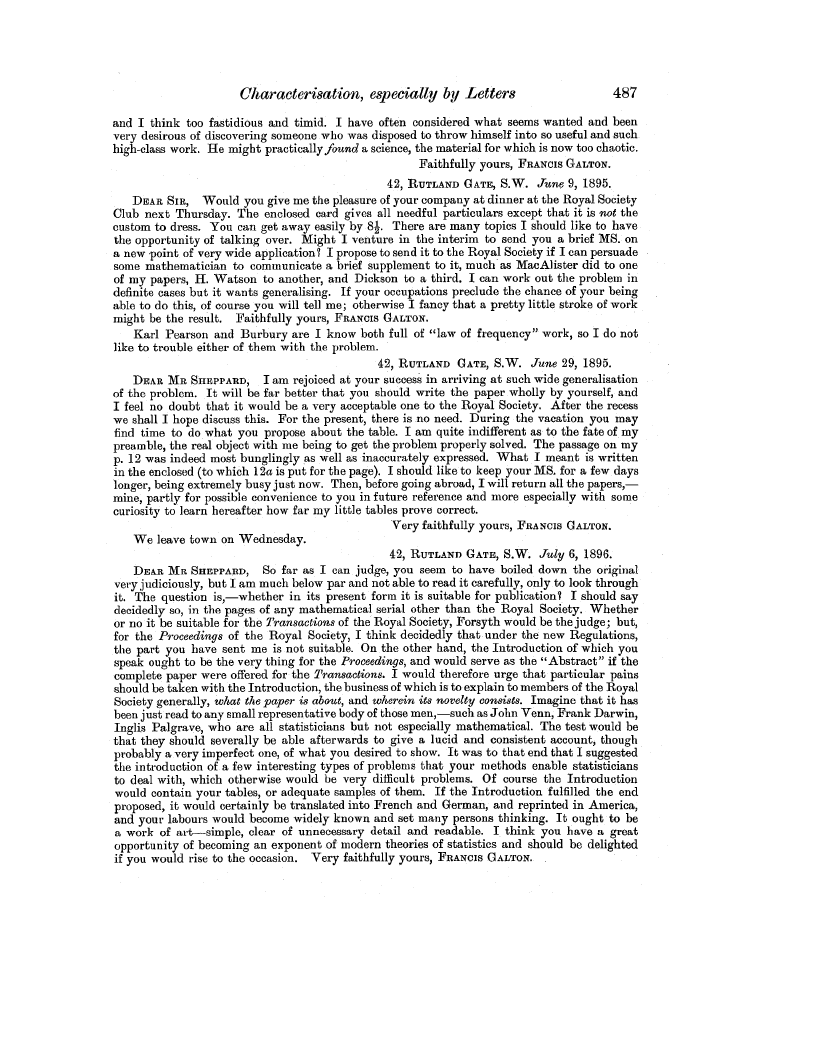| ||||||

OCR Rendition - approximate
Characterisation, especially by Letters 487 and I think too fastidious and timid. I have often considered what seems wanted and been very desirous of discovering someone who was disposed to throw himself into so useful and such high-class work. He might practically found a science, the material for which is now too chaotic. Faithfully yours, FRANCIS GALTON. 42, RUTLAND GATE, S.W. June 9, 1895. DEAR SIR, Would you give me the pleasure of your company at dinner at the Royal Society Club next Thursday. The enclosed card gives all needful particulars except that it is not the custom to dress. You can get away easily by 81. There are many topics I should like to have the opportunity of talking over. Might I venture in the interim to send you a brief MS. on a new point of very wide application? I propose to send it to the Royal Society if I can persuade some mathematician to communicate a brief supplement to it, much as MacAlister did to one of my papers, H. Watson to another, and Dickson to a third. I can work out the problem in definite cases but it wants generalising. If your occupations preclude the chance of your being able to do this, of course you will tell me; otherwise I fancy that a pretty little stroke of work might be the result. Faithfully yours, FRANCIS GALTON. Karl Pearson and Burbury are I know both full of "law of frequency" work, so I do not like to trouble either of them with the problem. 42, RUTLAND GATE, S.W. June 29, 1895. DEAR MR SHEPPARD, I am rejoiced at your success in arriving at such wide generalisation of the problem. It will be far better that you should write the paper wholly by yourself, and I feel no doubt that it would be a very acceptable one to the Royal Society. After the recess we shall I hope discuss this. For the present, there is no need. During the vacation you may find time to do what you propose about the table. I am quite indifferent as to the fate of my preamble, the real object with me being to get the problem properly solved. The passage on my p. 12 was indeed most bunglingly as well as inaccurately expressed. What I meant is written in the enclosed (to which 12a is put for the page). I should like to keep your MS. for a few days longer, being extremely busy just now. Then, before going abroad, I will return all the papers,mine, partly for possible convenience to you in future reference and more especially with some curiosity to learn hereafter how far my little tables prove correct. Very faithfully yours, FRANCIS GAL•rON, We leave town on Wednesday. 42, RUTLAND GATE, S.W. July 6, 1896. DEAR MR SHEPPARD, So far as I cann judge, you seem to have boiled down the original very judiciously, but I am much below par and not able to read it carefully, only to look through it. The question is,-whether in its present form it is suitable for publication? I should say decidedly so, in the pages of any mathematical serial other than the Royal Society. Whether or no it be suitable for the Transactions of the Royal Society, Forsyth would be the judge; but, for the Proceedings of the Royal Society, I think decidedly that under the new Regulations, the part you have sent me is not suitable. On the other hand, the Introduction of which you speak ought to be the very thing for the Proceedings, and would serve as the "Abstract" if the complete paper were offered for the Transactions. I would therefore urge that particular pains should be taken with the Introduction, the business of which is to explain to members of the Royal Society generally, what the paper is about, and wherein its novelty consists. Imagine that it has been just read to any small representative body of those men,-such as John Venn, Frank Darwin, Inglis Palgrave, who are all statisticians but not especially mathematical. The test would be that they should severally be able afterwards to give a lucid and consistent account, though probably a very imperfect one, of what you desired to show. It was to that end that I suggested the introduction of a few interesting types of problems that your methods enable statisticians to deal with, which otherwise would be very difficult problems. Of course the Introduction would contain your tables, or adequate samples of them. If the Introduction fulfilled the end proposed, it would certainly be translated into French and German, and reprinted in America, and your labours would become widely known and set many persons thinking. It ought to be a work of art-simple, clear of unnecessary detail and readable. I think you have a great opportunity of becoming an exponent of modern theories of statistics and should be delighted if you would rise to the occasion. Very faithfully yours, FRANCIS CALTON.
|